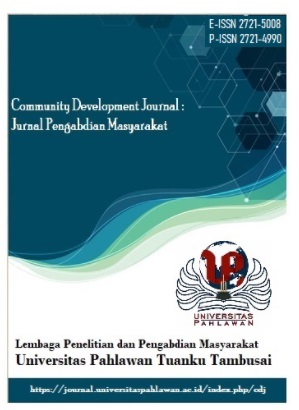TEACHER’S CORRECTIVE FEEDBACK STRATEGIES AND THEIR INFLUENCE ON STUDENTS’ SPEAKING FLUENCY IN EFL CONTEXTS
DOI:
https://doi.org/10.31004/jrpp.v8i1.44005Keywords:
Corrective Feedback, Speaking Performance, Learner UptakeAbstract
This study aims to analyze the role and effectiveness of corrective feedback in improving students' speaking performance in English as a Foreign Language (EFL) classrooms. Corrective feedback is considered one of the essential strategies in the language learning process, especially in addressing students' language errors both directly and indirectly. Various types of corrective feedback, such as recasts, prompts, and explicit correction, are known to facilitate effective learner uptake and positively impact students' speaking accuracy and fluency. Based on a comprehensive review of academic literature, this study reveals that timely and context-appropriate corrective feedback significantly contributes to the development of students' speaking skills. Additionally, both teachers' and students' perceptions of the importance of corrective feedback play a crucial role in determining its effectiveness. Teachers who can select the appropriate feedback techniques based on students' characteristics and learning situations help learners build confidence and self-correct their language errors more effectively. This study suggests that English teachers should actively and consistently provide corrective feedback during speaking activities. The selection of feedback types and timing should be adjusted to maximize their impact on students' speaking development. Thus, corrective feedback serves not only as a correction tool but also as a pedagogical strategy that encourages students to engage more actively in the language learning process.References
Al-Hoorie, A. H., & Vitta, J. P. (Eds.). (2019). The Palgrave handbook of motivation for language learning. Palgrave Macmillan. https://doi.org/10.1007/978-3-030-28380-3
Ammar, A., & Spada, N. (2006). One size fits all? Recasts, prompts, and L2 learning. Studies in Second Language Acquisition, 28(4), 543-574. https://doi.org/10.1017/S0272263106060268
Brown, H. D. (2007). Teaching by principles: An interactive approach to language pedagogy (3rd ed.). Pearson Longman.
Bu, Y., Ma, T., Li, W., Zhou, H., Jia, J., Chen, S., Xu, K., Shi, D., Wu, H., Yang, Z., Li, K., Wu, Z., Shi, Y., Lu, X., & Liu, Z. (2021). PTeacher: A computer-aided personalized pronunciation training system with exaggerated audio-visual corrective feedback. arXiv preprint arXiv:2105.05182.
Ellis, R. (2009). Corrective feedback and teacher development. L2 Journal, 1(1), 3-18. https://doi.org/10.5070/L2.V1I1.9054
Harmer, J. (2007). The practice of English language teaching (4th ed.). Pearson Longman.
Lightbown, P. M., & Spada, N. (2013). How languages are learned (4th ed.). Oxford University Press.
Lyster, R., & Ranta, L. (1997). Corrective feedback and learner uptake: Negotiation of form in communicative classrooms. Studies in Second Language Acquisition, 19(1), 37-66. https://doi.org/10.1017/S0272263197001034
Lyster, R., Saito, K., & Sato, M. (2013). Oral corrective feedback in second language classrooms. Language Teaching, 46(1), 1-40. https://doi.org/10.1017/S0261444812000365
Ölmezer-Öztürk, E., & Öztürk, G. (2016). Types and timing of oral corrective feedback in EFL classrooms: Voices from students. Novitas-ROYAL (Research on Youth and Language), 10(2), 113-133.
Phuong, T. T. B., & Huani, N. B. (2018). Teacher corrective feedback on students’ speaking performance and their uptake in EFL classes. European Journal of Foreign Language Teaching, 3(3), 123-138.
Sahatsathatsana, S. (2017). Oral corrective feedback in English as a foreign language classrooms: A study of student and teacher perceptions. Studies in English Language Teaching, 5(1), 112-123.
Saito, K. (2013). Reexamining effects of form‐focused instruction on L2 pronunciation development. Studies in Second Language Acquisition, 35(1), 1-29. https://doi.org/10.1017/S0272263112000666
Sato, M., & Lyster, R. (2012). Peer interaction and corrective feedback for accuracy and fluency development: Monitoring, practice, and proceduralization. Studies in Second Language Acquisition, 34(4), 591-626.
Sheen, Y. (2007). The effect of focused written corrective feedback and language aptitude on ESL learners’ acquisition of articles. TESOL Quarterly, 41(2), 255-283. https://doi.org/10.2307/40264364
Sheen, Y., & Ellis, R. (2011). Corrective feedback in language teaching. In E. Hinkel (Ed.), Handbook of research in second language teaching and learning (Vol. 2, pp. 593-610).
Taheri, M., & Zarei, G. R. (2021). Teachers’ corrective feedback and learners’ uptake in EFL classrooms: A case of gender-based analysis. Theory and Practice in Language Studies, 11(3), 313-319. https://doi.org/10.17507/tpls.1103.04
Tran, T. T. B., & Nguyen, B. H. (2018). Teacher corrective feedback on students’ speaking performance and their uptake in EFL classes. European Journal of Foreign Language Teaching, 3(3), 123-138.
Yang, J., & Lyster, R. (2010). Effects of form-focused practice and feedback on Chinese EFL learners' acquisition of regular and irregular past tense forms. Studies in Second Language Acquisition, 32(2), 235-263.
Zhang, L. J. (2017). Teacher feedback and learner uptake in EFL speaking classrooms: A case study. English Language Teaching, 10(7), 105-114. https://doi.org/10.5539/elt.v10n7p105
Zhao, Y. (2015). The effects of corrective feedback on the acquisition of English word stress by Chinese learners. System, 55, 1-12.
Zhu, M., & Wang, F. (2019). The effects of recasts on EFL learners' pronunciation
Downloads
Published
How to Cite
Issue
Section
License
Copyright (c) 2025 Henny Merizawati, Rasyimah Rasyimah, Hendra Sudarso, Rinda Riztya, Muhammad Wahyudi, Desty Endrawati Subroto

This work is licensed under a Creative Commons Attribution-ShareAlike 4.0 International License.






